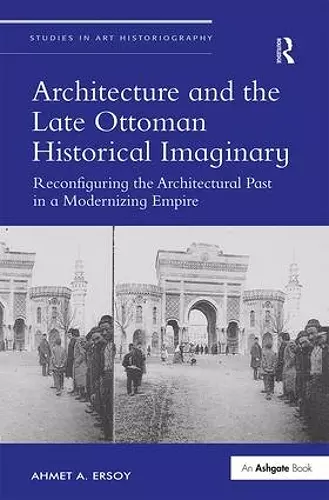Architecture and the Late Ottoman Historical Imaginary
Reconfiguring the Architectural Past in a Modernizing Empire
Format:Hardback
Publisher:Taylor & Francis Ltd
Published:30th Apr '15
Currently unavailable, and unfortunately no date known when it will be back
This hardback is available in another edition too:
- Paperback£42.99(9780367432836)

While European eclecticism is examined as a critical and experimental moment in western art history, little research has been conducted to provide an intellectual depth of field to the historicist pursuits of late Ottoman architects as they maneuvered through the nineteenth century’s vast inventory of available styles and embarked on a revivalist/Orientalist program they identified as the ’Ottoman Renaissance.’ Ahmet A. Ersoy’s book examines the complex historicist discourse underlying this belated ’renaissance’ through a close reading of a text conceived as the movement’s canonizing manifesto: the Usul-i Mi’mari-i ’Osmani [The Fundamentals of Ottoman Architecture] (Istanbul, 1873). In its translocal, cross-disciplinary scope, Ersoy’s work explores the creative ways in which the Ottoman authors straddled the art-historical mainstream and their new, self-orientalizing aesthetics of locality. The study reveals how Orientalism was embraced by its very objects, the self-styled ’Orientals’ of the modern world, as a marker of authenticity, and a strategically located aesthetic tool to project universally recognizable images of cultural difference. Rejecting the lesser, subsidiary status ascribed to non-western Orientalisms, Ersoy’s work contributes to recent, post-Saidian directions in the study of cultural representation that resituate the field of Orientalism beyond its polaristic core, recognizing its cross-cultural potential as a polyvalent discourse.
'Critical historiography at its best ... This refreshing account of the art, architecture and culture of Tanzimat takes issue with traditional frameworks of analysis and thrives on attention to nuance, contingency, ambivalence, syncretism and cultural reciprocity in explaining late Ottoman Empire’s engagement with Europe ... A timely contribution to Ottoman/Turkish studies as well as to broader theoretical debates on orientalism, historicism, revivalism, authenticity, cultural difference and identity formation in the modern world... Above all, a much-needed cosmopolitan perspective to counteract the nationist neo-orientalism of political Islam in Turkey today.'
-- Sibel Bozdogan, Harvard University, USA
'Ersoy proves himself to be a perceptive historian who recognizes both the aspirations and ingenuity of his actors and the tenuousness of their political, economic, and cultural position on the world stage. On the whole, I would recommend this book as an invaluable addition to the libraries of not just those interested in the history of the Late Ottoman Empire, but to anyone who seeks a thoughtful reading of the polyvalent, multi-local, and mutually transformative aspects of modernization processes.'
-- CAA Reviews
ISBN: 9781472431394
Dimensions: unknown
Weight: 839g
334 pages